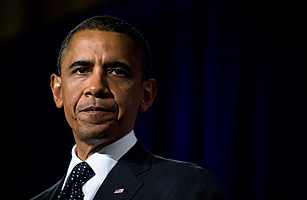
President Barack Obama
Barack Obama is being politically crushed in a vise. From above, by elite opinion about his competence. From below, by mass anger and anxiety over unemployment. And it is too late for him to do anything about this predicament until after November's elections.
With the exception of core Obama Administration loyalists, most politically engaged elites have reached the same conclusions: the White House is in over its head, isolated, insular, arrogant and clueless about how to get along with or persuade members of Congress, the media, the business community or working-class voters. This view is held by Fox News pundits, executives and anchors at the major old-media outlets, reporters who cover the White House, Democratic and Republican congressional leaders and governors, many Democratic business people and lawyers who raised big money for Obama in 2008, and even some members of the Administration just beyond the inner circle.
On Friday, after the release of the latest bleak unemployment data — the last major jobs figures before the midterms — Obama said, "Putting the American people back to work, expanding opportunity, rebuilding the economic security of the middle class is the moral and national challenge of our time." But elites feel the President has failed to meet that challenge and are convinced he will be unable to do so in the remainder of his term. Moreover, there is a growing perception that Obama's decisions are causing harm — that businesses are being hurt by the Administration's legislation and that economic recovery is stalling because of the uncertainty surrounding energy policy, health care, deficits, housing, immigration and spending.
And that sentiment is spreading. Many members of the general public appear deeply skeptical of Obama's capacity to turn things around, especially, but not exclusively, those inclined to dislike him — Tea Partyers and John McCain voters, but also tens of millions of middle-class Americans, including quite a few who turned out for Obama in 2008.
The misery afflicting the country has no political affiliation. Listen to the voices from this striking TV ad for Rob Portman, the Republican former Congressman and Bush budget director who is running for Senate from Ohio. One woman at a Dayton career fair says starkly, "There are no jobs." A man announces plaintively and with obvious frustration, "I've been looking for a job now for 13 months." Events like this job fair are becoming the grim iconic gatherings of our time, the breadlines for the Obama years.
Most of Obama's private (and sometimes public) rebuttals to the voices slamming him on all sides are justified or spot on. He did inherit a lot of problems from the Bush Administration. He did act quickly in the initial weeks of his Administration to stave off a worldwide depression. His efforts at job creation have been obstructed by Republicans (even the proposals based on policies supported by the GOP in the past). His opponents haven't put forth specifics of their own, nor offered genuine compromise, while the media have allowed the right's activists and gabbers to run wild with criticism without furnishing legitimate alternative solutions.
But Obama has exacerbated his political problems not just by failing to enact policies that would have actually turned the economy around, but also by authorizing a series of tactical moves intended to demonize Republicans and distract from the problems at hand. He has wasted time lambasting his foes when he should have been putting forth his agenda in a clear, optimistic fashion, defending the benefits of his key decisions during the past two years (health care and the Troubled Asset Relief Program, for example) and explaining what he would do with a re-elected Democratic majority to spur growth.
Throughout the year, we have been treated to Obama-led attacks on George W. Bush and Dick Cheney, Rush Limbaugh, Congressman Joe Barton (for his odd apology to BP), John Boehner (for seeking the speakership — or was it something about an ant?) and Fox News (for everything). Suitable Democratic targets in some cases, perhaps, but not worth the time of a busy Commander in Chief. In the past few days, we have witnessed the spectacle of the President himself and his top advisers wading into allegations that Republicans are attempting to buy the election using foreign money laundered through the Chamber of Commerce, combining with Karl Rove and his wealthy backers to fund a flood of negative television commercials. Not only is this issue convoluted and far-fetched, but it also distracts from the issues voters care about, frustrating political insiders and alienating struggling citizens (not that many are following such an offbeat story line). Feinting and gibing can't obscure those job numbers.
The President and Democrats have passed many significant measures (the stimulus spending, the auto-company rescue, the health care law and the financial regulation effort) that someday may be seen as brave and bold, the foundation for a better economy. Obama and his closest aides certainly think that will happen. But the President was correct when he said Friday, "the only piece of economic news that folks still looking for work want to hear is, 'You're hired,'" and that's still not occurring for too many Americans.
The politically good news for Obama is that no matter what the outcome of the midterm elections, everything changes in January. Republicans will have a greater obligation, politically and morally, to help govern, rather than thwart and badger. The President will get a chance, in his State of the Union address and in his budget proposal, to show he is turning the page on the political horrors of 2010 for his party and the nation. But before then, Republicans are almost certainly going to demonstrate that you can beat something with nothing, especially when Americans seem to think that the Obama Administration hasn't much to offer either, except more of the same that isn't working.
One Nation, Halperin's politics column for TIME.com, appears every Monday.